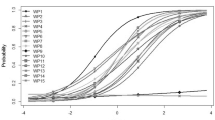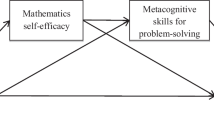Abstract
Many factors influence a student’s performance in word (or textbook) problem solving in class. Among them is the comprehension process the pupils construct during their attempt to solve the problem. The comprehension process may include some less formal representations, based on pupils’ real-world knowledge, which support the construction of a ‘situation model’. In this study, we examine some factors related to the pupil or to the word problem itself, which may influence the comprehension process, and we assess the effects of the situation model on pupils’ problem solving performance. The sample is composed of 750 pupils of grade 6 elementary school. They were selected from 35 classes in 17 Francophone schools located in the province of Quebec, Canada. For this study, 3 arithmetic problems were developed. Each problem was written in 4 different versions, to allow the manipulation of the type of information included in the problem statement. Each pupil was asked to solve 3 problems of the same version and to complete a task that allowed us to evaluate the construction of a situation model. Our results show that pupils with weaker arithmetic skills construct different representations, based on the information presented in the problem. Also, pupils who give greater importance to situational information in a problem have greater success in solving the problem. The situation model influences pupils’ problem solving performance, but this influence depends on the type of information included in the problem statement, as well as on the arithmetic skills of each individual pupil.
Similar content being viewed by others
References
Barnett, J. (1979). The study of syntax variables. In G. A. Goldin & C. E. McClintock (Eds.), Task variables in mathematical problem solving (pp. 23–68). Hillsdale, NJ: Lawrence Erlbaum Associates.
Bélanger, N., Gauthier, C. & Tardif, M. (1993). Évolution des programmes de mathématiques: de 1861 à nos jours. Sainte-Foy, Quebec, Canada: Université Laval.
Caldwell, J. H. & Goldin, G. A. (1979). Variables affecting word problem difficulty in elementary school mathematics. Journal for Research in Mathematics Education, 10(5), 323–336.
Coquin-Viennot, D. & Moreau, S. (2003). Highlighting the role of the episodic situation model in the solving of arithmetical problems. European Journal of Psychology of Education, 18(3), 267–279.
Coquin-Viennot, D. & Moreau, S. (2007). Arithmetic problems at school: When there is an apparent contradiction between the situation model and the problem model. The British Journal of Educational Psychology, 77(1), 69–80.
Cummins, D. D., Kintsch, W., Reusser, K. & Weimer, R. (1988). The role of understanding in solving word problems. Cognitive Psychology, 20(4), 405–438.
El Boudali, A. (1984). L'influence de la familiarité du contexte sur la résolution de problèmes verbaux en mathématiques, au niveau du secondaire au Maroc. Unpublished M.A., Sainte-Foy: Université Laval.
Hembree, R. (1992). Experiments and relational studies in problem-solving: A meta-analysis. Journal for Research in Mathematics Education, 23, 242–273.
Kintsch, W. (1998). Comprehension: A paradigm for cognition. Cambridge, MA: Cambridge University Press.
Kintsch, W. & Greeno, J. G. (1985). Understanding and solving word arithmetic problems. Psychological Review, 92(1), 109–129.
Kintsch, W. & van Dijk, T. A. (1978). Toward a model of text comprehension and production. Psychological Review, 85(5), 363–394.
Kulm, G. (1984). The classification of problem-solving research variables. In G. A. Goldin & C. E. McClintock (Eds.), Task variables in mathematical problem solving (pp. 1–21). Philadelphia: The Franklin Institute Press.
Moreau, S. & Coquin-Viennot, D. (2003). Comprehension of arithmetic word problems by fifth-grade pupils: Representations and selection of information. The British Journal of Educational Psychology, 73(1), 109–121.
Nasser, R. & Carifio, J. (1993). Key contextual features of algebra word problems: A theoretical model and review of the literature. Paper presented at the annual conference of the Eastern Educational Research Association (Clearwater, FL, February 17–22, 1993).
National Council of Teachers of Mathematics (1980). An agenda for action: Recommendations for school mathematics of the 1980s. Reston, VA: NCTM.
National Council of Teachers of Mathematics (1989). Curriculum and evaluation standards for school mathematics. Reston, VA: NCTM.
National Council of Teachers of Mathematics (2000). Principles and standards for school mathematics. Reston, VA: NCTM.
Polya, G. (1945). How to solve it. Princeton, NJ: Princeton University Press.
Reusser, K. (1990). From text to situation to equation: Cognitive simulation of understanding and solving mathematical word problems. In H. Mandl, E. De Corte, S. N. Bennett & H. F. Friedrich (Eds.), Learning & instruction: European research in an international context (Vol. 2, pp. 477–498). Oxford, England: Pergamon Press.
Sovik, N., Frostrad, P. & Heggberget, M. (1999). The relation between reading comprehension and task-specific strategies used in arithmetical word problems. Scandinavian Journal of Educational Research, 43(4), 371–398.
Stern, E. & Lehrndorfer, A. (1992). The role of situational context in solving word problems. Cognitive Development, 7(1), 259–268.
van Dijk, T. A. (1977). Semantic macro-structures and knowledge frames in discourse comprehension. In M. A. Just & P. A. Carpenter (Eds.), Cognitive processes in comprehension (pp. 3–32). Hillsdale, NJ: Lawrence Erlbaum Associates.
Author information
Authors and Affiliations
Corresponding author
Rights and permissions
About this article
Cite this article
Voyer, D. PERFORMANCE IN MATHEMATICAL PROBLEM SOLVING AS A FUNCTION OF COMPREHENSION AND ARITHMETIC SKILLS. Int J of Sci and Math Educ 9, 1073–1092 (2011). https://doi.org/10.1007/s10763-010-9239-y
Received:
Accepted:
Published:
Issue Date:
DOI: https://doi.org/10.1007/s10763-010-9239-y




